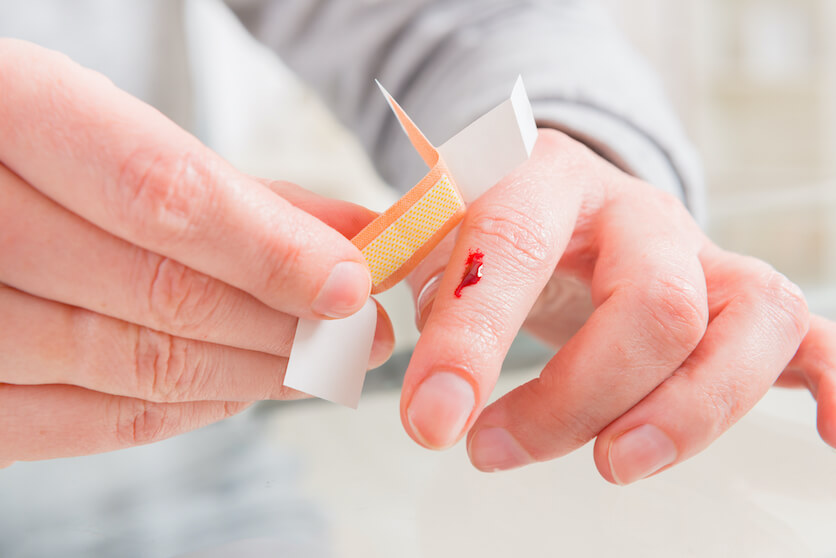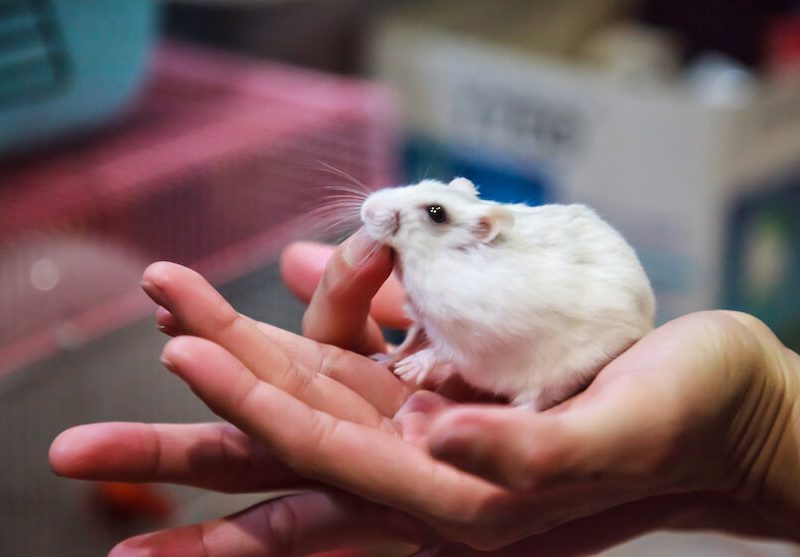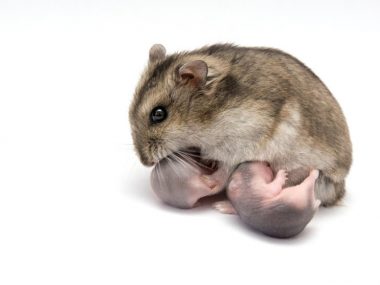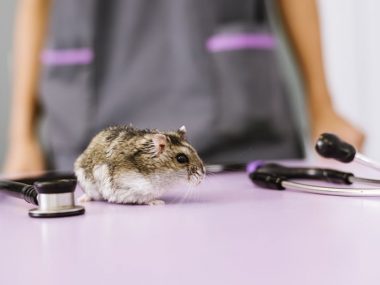Just because an animal has teeth doesn’t mean it will bite, right? Well, you might be surprised to find out the answer to that question, especially if you are a hamster parent. Get to know everything about hamster bites from this guide.
Table of Contents
Why Do Hamsters Bite?
Hamsters have a predisposition to being aggressive (agonistic), according to the Manual of Exotic Pet Practice. Whether a hamster comes from a breeder or pet store, they will have the instinctual nature of aggressiveness hardwired into their brain. They will exhibit this behavior under certain conditions.
Feeling Threatened Or Afraid
Fear is the leading cause of hamster bites. New owners get their hamster home and immediately want to hold it. The hamster doesn’t know you and isn’t familiar with your scent. It perceives a hand reaching into its cage as a threat causing it to react aggressively to protect itself. Handling/taming a new hamster is a must. Without it, you will have an aggressive, unhappy pet.
Pain Or Sickness
We ourselves know when we don’t feel good, the last thing we want is someone bothering us. This applies to a pet hamster. If your hamster has been properly handled/tamed, biting may be a warning sign that it is sick. In cases like this, a visit to the vet may be warranted.
Lack Of Handling/Taming
This is the second leading reason hamsters bite. They haven’t been given the appropriate time to acclimate and get to know their new home and owner. It can take days or weeks to get a hamster comfortable being approached or held.
Territorialism
Hamsters sharing their cage with other hamsters may lead to territorialism among them. Biting may be directed towards the other hamster in the same cage. Situations like this require separating the hamsters.
Being Startled
If your hamster is sleeping or has its back turned towards you, and you reach in to touch them or pick them up, guess what’s going to happen? They will most likely bite you. Being startled is an immediate reaction to feeling threatened or scared.
What Happens If A Hamster Bites You?
The most important thing to remember is if your hamster happens to bite you, it’s because of one of the above reasons we mentioned. If you do happen to get bit, it’s how you react that will determine your future relationship with your pet hamster.
Rather than chastise or try to discipline your hamster by scolding it, gently put it back in its cage and take care of the bite area. Hamsters don’t understand right from wrong, nor will they respond to us yelling or pointing fingers at it when it bites.
Hamster Bites and Transmissible Diseases To Humans

Most hamster bites do not cause serious issues. However, it helps to be aware of potential diseases that can occur as a result of being bit by a hamster. The CDC (Centers for Disease Control) outlines a few common diseases in rodents (which include hamsters.) The inside of a hamster’s mouth (like any other animal) inherently contains a certain amount of bacteria.
Once the skin is punctured from the teeth of a hamster, that bacteria can enter our body through the bite wound. This is why it’s important to properly clean the bite wound immediately.
Lymphocytic Choriomeningitis Virus
Although rare, this neurological virus may be transmitted through the bite of a hamster. Symptoms may appear around 8-13 days according to the CDC (Centers for Disease Control), which include fever, fatigue, no appetite, all-over aching, headache, nausea, vomiting, sore throat, joint pain, chest pain, and pain in the salivary glands. Symptoms may worsen, causing meningitis, encephalitis, meningoencephalitis, hydrocephalus, myocarditis, or paralysis.
Rat Bite Fever
This rare bacterial disease may be transmittable through a hamster bite. The CDC lists two different types of bacteria responsible for causing this disease, each having its own set of symptoms.
Streptobacillary Rat Bite Fever
The onset of symptoms can occur a few days or up to 3 weeks after coming into contact with the bacteria.
- Fever
- Vomiting
- Headache
- Muscle aches
- Swelling in the joints
- Skin rash
Spirillary Rat Bite Fever
The onset of symptoms may occur a few days or up to 3 weeks after coming into contact with the bacteria.
- Fever (several bouts)
- Swelling or ulceration around the wound site
- Swollen lymph nodes
- Skin rash
Hamster Bite Treatment
Hamster teeth are sharp enough to penetrate the skin should your hamster attempt to bite you. If you find yourself in a bit of pickle with a bite wound from your hamster, you would immediately clean the wound with soap and warm water. Monitor the wound for any unusual signs of infection. In the event you do notice any changes, contact your healthcare provider.
How To Train A Hamster Not To Bite
When bringing a new hamster home, you should follow a few steps to allow it to get acquainted with you:
- Allow it to acclimate to the new environment for a few days before handling.
- It should go through proper handling for it to become tame and less prone to bite.
- Be very patient and allow the hamster to get used to you in its own time, not yours.
- Always be gentle. If you are unexpectedly bitten, gently place the hamster back into the cage.
- Anticipate bites until handling/taming is completed.
- Be careful not to have food or the smell of food on your hands when handling it because your hamster may perceive your fingers as food.
- Always wash your hands before and after handling.
- Let a sleeping hamster be; otherwise, startling one may result in a bite.
What Should You Do If Your Hamster Bites You?
Our first (and normal) reaction to a painful stimulus is yelling and jerking our hand away. But what if you are holding the hamster in your hand, and this occurs? Many hamsters have been dropped because of this, and unfortunately, many suffer serious or fatal injuries.
So, the typical reaction to a bite can’t happen for the sake of your hamster’s life. Many hamster parents personally know and understand “Suck it up, buttercup” when it comes to a hamster bite because it will invariably happen. However, small children that get bitten may not be able to adopt this philosophy and may react to the pain of a bite by dropping the hamster or hurting it.
Do You Need A Tetanus If A Hamster Bites You?
In a medical study published (“Animal and Human Bite Wounds,”) researchers were very specific to state anyone who is bitten by an animal “must have their immunization against tetanus checked, and if necessary, updated. If there’s any doubt about adequate immunization against tetanus, full vaccination should be provided.”
How Painful Is A Hamster Bite?
There’s no specific answer to how painful a hamster is because everyone has different pain thresholds. Some may perceive a hamster bite to be nothing more than a bee sting, while others may find it to be excruciating.
Typically, a hamster bite to the average person may feel similar to being tightly pinched. The size of the hamster’s teeth can affect how painful the bite may feel. A Syrian hamster’s teeth are bigger and, of course, will cause a more painful bite compared to that of a dwarf hamster bite.
Pass On The Pain?
Sadly, once potential hamster parents discover those little furry animals are capable of delivering a bite, they may opt for a different type of pet. Something to remember is regardless of an animal species, if provoked, scared, hurt, or mishandled; it can bite. A hamster won’t hesitate to defend itself; this is why handling/taming a hamster is a must.






